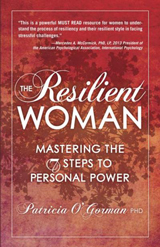
Psychologist in private practice in Albany, Saranac Lake, New York, is noted for her work in child welfare, mental health, and substance abuse. She has served as a consultant to organizations in preventative and clinical strategic planning. Dr. O’Gorman is a cofounder of the National Association for Children of Alcoholics, and has held positions ranging from clinical director of child welfare agency to interim director of a crime victims organization to director of prevention for NIAAA.
I was a recent speaker at a “Theology on Tap” lecture. This speaker series takes place in the fun, relaxed setting of a local pub, and my topic, of course, was my latest book, The Resilient Woman. All was going well when I was asked, “Who are your models for resilience?”
I had an immediate answer: my resilience models are in the films I enjoy—Beatrice Kiddoe, (the heroine in the Kill Bill movies), and Katniss Evergreen, the heroine in The Hunger Games—and in the real world. They also include women like political activist Aung San Suu Kyi from Burma, who was imprisoned for her efforts to reform Mynmar, as well as my own mother and grandmother. Later, as I contemplated the question again, I realized that this is a question men would not ask each other. Men have their role models, and many of them, from all sectors of life.
For women, the question “Who are your models” has many answers, but few of them are obvious. This is a shame, and the reason is that, quite frankly, women have not been routinely celebrated in history. We have been largely invisible and our accomplishments not deemed worthy of note due to our gender. We have even been punished because some saw stepping outside of defined roles as “unfortunate.” As a result, many of the role models we choose, are, well, personal. So to be asked this question often causes a pause as we each must stop and consider our answer.
One of the reasons this is such an important question for each of us isn’t because of a lack of available heroines. But sadly, there are many models for the superficial (and ultimately devastating) notions of what society holds up as important. We secretly admire and aspire to be something we are not—and most often, we focus on the way we look—and these internalized ideas become our girly thoughts, the subtle, outside messages we internalize that cause us to blame ourselves—even berate ourselves—for not achieving what we feel we should. Girly thoughts are decidedly anti-resilience.
A few days after my lecture, my book editor sent me an article that spoke to this dilemma of who our models and heroines might be. It illustrated how a professional photographer is teaching her daughter to celebrate real women by having the five-year-old pose as famous women and taking a picture of her as each of these inspirational women from history. What a terrific use of this mother’s strength and talent, I thought, as she teaches her daughter—and the rest of us—how to answer this question.
I invite you to view her gallery here and then ask yourself the question, “Who would pose your daughter as?” I hope you’ll share your thoughts in the comments, too!
Women today have the ability and the opportunity to reshape the discussion so the generations that follow us will be the resilient women of the future. Let’s give them the models they need to banish girly thoughts forever!
Patricia A. O'Gorman, Ph.D., is a psychologist in private practice. She is noted for her work on women, trauma, and substance abuse and for her warm, inspiring, and amusing presentations that make complex issues accessible and even fun. She has served as a consultant to organizations across the country in preventative and clinical strategic planning. Dr. O'Gorman is a cofounder of the National Association for Children of Alcoholics, and she has held positions ranging from director of a rape crisis center to clinical director of a child welfare agency, and director of the division of prevention for the National Institute on Alcohol Abuse and Alcoholism (NIAAA). She is a veteran of numerous television appearances, including Good Morning America, Today, and AM Sunday and is the author of eight books including: The Girly Thoughts 10 Day Detox Plan (2014), The Resilient Woman: Mastering the 7 Steps to Personal Power (2013), and Healing Trauma Through Self-Parenting (2012) 12 Steps to Self-Parenting.

